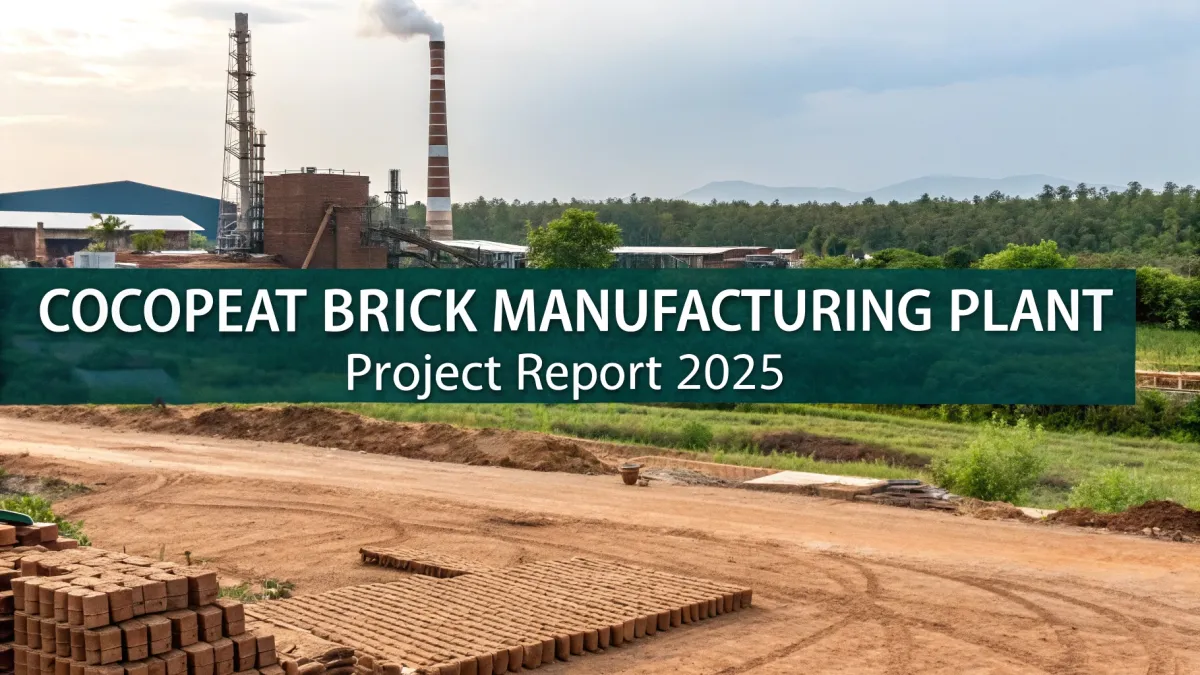
Cocopeat Brick Manufacturing Plant Project Report 2025, Machinery, Cost And Raw Material Requirements
Setting up a cocopeat brick manufacturing plant requires investment in coir processing units, drying systems, compression machines, and packaging facilities. Key factors include raw material availability near coconut-producing regions, energy efficiency, quality standards, and effective distribution networks.
IMARC Group's report, titled “ Cocopeat Brick Manufacturing Plant Project Report 2025: Industry Trends, Plant Setup, Machinery, Raw Materials, Investment Opportunities, Cost and Revenue,” provides a complete roadmap for setting up a cocopeat brick manufacturing plant. It covers a comprehensive market overview to micro-level information such as unit operations involved, raw material requirements, utility requirements, infrastructure requirements, machinery and technology requirements, manpower requirements, packaging requirements, transportation requirements, etc.
Request for a Sample Report : https://www.imarcgroup.com/cocopeat-brick-manufacturing-plant-project-report/requestsample
Cocopeat Brick Industry Outlook 2025:
The cocopeat brick industry outlook for 2025 highlights strong growth driven by rising demand for sustainable and eco-friendly agricultural inputs. Increasing adoption of hydroponics, organic farming, and greenhouse cultivation is expected to fuel market expansion. With growing restrictions on peat moss usage due to environmental concerns, cocopeat is emerging as a preferred alternative worldwide. Expanding horticulture and floriculture sectors, along with government support for sustainable farming practices, further strengthen market prospects. Overall, the cocopeat brick industry is positioned for steady global growth, particularly in regions emphasizing green agriculture and water-efficient cultivation method.
Key Insights for Cocopeat Brick Manufacturing Plant Setup:
Detailed Process Flow:
-
Product Overview
Unit Operations Involved
Mass Balance and Raw Material Requirements
Quality Assurance Criteria
Technical Tests
Project Details, Requirements and Costs Involved:
-
Land, Location and Site Development
Plant Layout
Machinery Requirements and Costs
Raw Material Requirements and Costs
Packaging Requirements and Costs
Transportation Requirements and Costs
Utility Requirements and Costs
Human Resource Requirements and Costs
Capital Expenditure (CapEx) and Operational Expenditure (OpEx) Analysis:
Project Economics:
-
Capital Investments
Operating Costs
Expenditure Projections
Revenue Projections
Taxation and Depreciation
Profit Projections
Financial Analysis
Profitability Analysis:
-
Total Income
Total Expenditure
Gross Profit
Gross Margin
Net Profit
Net Margin
Key Cost Components of Setting Up a Cocopeat Brick Plant
-
Land & Infrastructure – Site acquisition, drying yards, storage, and processing facilities
Machinery & Equipment – Sieving machines, drying units, compression machines, and packaging systems
Raw Materials – Coconut husks and coir pith sourced from coconut processing units
Energy & Utilities – Electricity, water, and fuel for drying and compression processes
Labor & Expertise – Skilled operators, technicians, and quality control staff
Regulatory Compliance – Environmental permits, waste management systems, and export certifications
Logistics & Distribution – Packaging, warehousing, and domestic/export transportation networks
Economic Trends Influencing Cocopeat Brick Plant Setup Costs 2025
-
Agricultural Growth – Rising demand from organic farming, hydroponics, and horticulture industries
Sustainability Focus – Shift toward eco-friendly growing mediums replacing peat moss
Raw Material Availability – Dependence on coconut-producing regions influencing supply stability
Global Trade Demand – Expanding export opportunities in Europe, North America, and the Middle East
Energy Price Trends – Rising electricity and fuel costs impacting drying and processing expenses
Government Policies – Support for green agriculture and export-oriented agro-industries
Speak to an Analyst for Customized Report: https://www.imarcgroup.com/request?type=report&id=30625&flag=E
Challenges and Considerations for Investors in Cocopeat Brick Plant Projects:
-
Seasonal Raw Material Supply – Dependence on coconut harvest cycles for consistent input
Quality Standards – Meeting international requirements for moisture, pH, and contamination levels
Market Competition – Presence of established exporters and low-cost producers
Logistics Costs – High transportation and export handling expenses
Awareness Barriers – Need for education on cocopeat benefits in new markets
Sustainability Certification – Growing need for eco-labels and compliance with green farming standards
Conclusion:
The cocopeat brick industry in 2025 is poised for sustained growth, supported by the rising global shift toward sustainable agriculture, hydroponics, and organic farming practices. Establishing a manufacturing plant presents attractive opportunities, particularly in coconut-producing regions, but requires careful attention to raw material availability, quality assurance, and compliance with international standards. While competition and logistics costs remain key challenges, increasing demand for eco-friendly growing mediums and supportive government policies strengthen the sector's outlook. Investors focusing on efficient production, export readiness, and sustainability certifications will be well-positioned to capitalize on the expanding global market for cocopeat bricks.
About Us:
IMARC Group is a global management consulting firm that helps the world's most ambitious changemakers to create a lasting impact. The company excel in understanding its client's business priorities and delivering tailored solutions that drive meaningful outcomes. We provide a comprehensive suite of market entry and expansion services. Our offerings include thorough market assessment, feasibility studies, company incorporation assistance, factory setup support, regulatory approvals and licensing navigation, branding, marketing and sales strategies, competitive landscape, and benchmarking analyses, pricing and cost research, and procurement research.
Contact Us:
IMARC Group
134 N 4th St. Brooklyn, NY 11249, USA
Email: sales[@]imarcgroup.com
Tel No:(D) +91 120 433 0800
United States: (+1-201971-6302)
Legal Disclaimer:
MENAFN provides the
information “as is” without warranty of any kind. We do not accept
any responsibility or liability for the accuracy, content, images,
videos, licenses, completeness, legality, or reliability of the information
contained in this article. If you have any complaints or copyright
issues related to this article, kindly contact the provider above.

















Comments
No comment